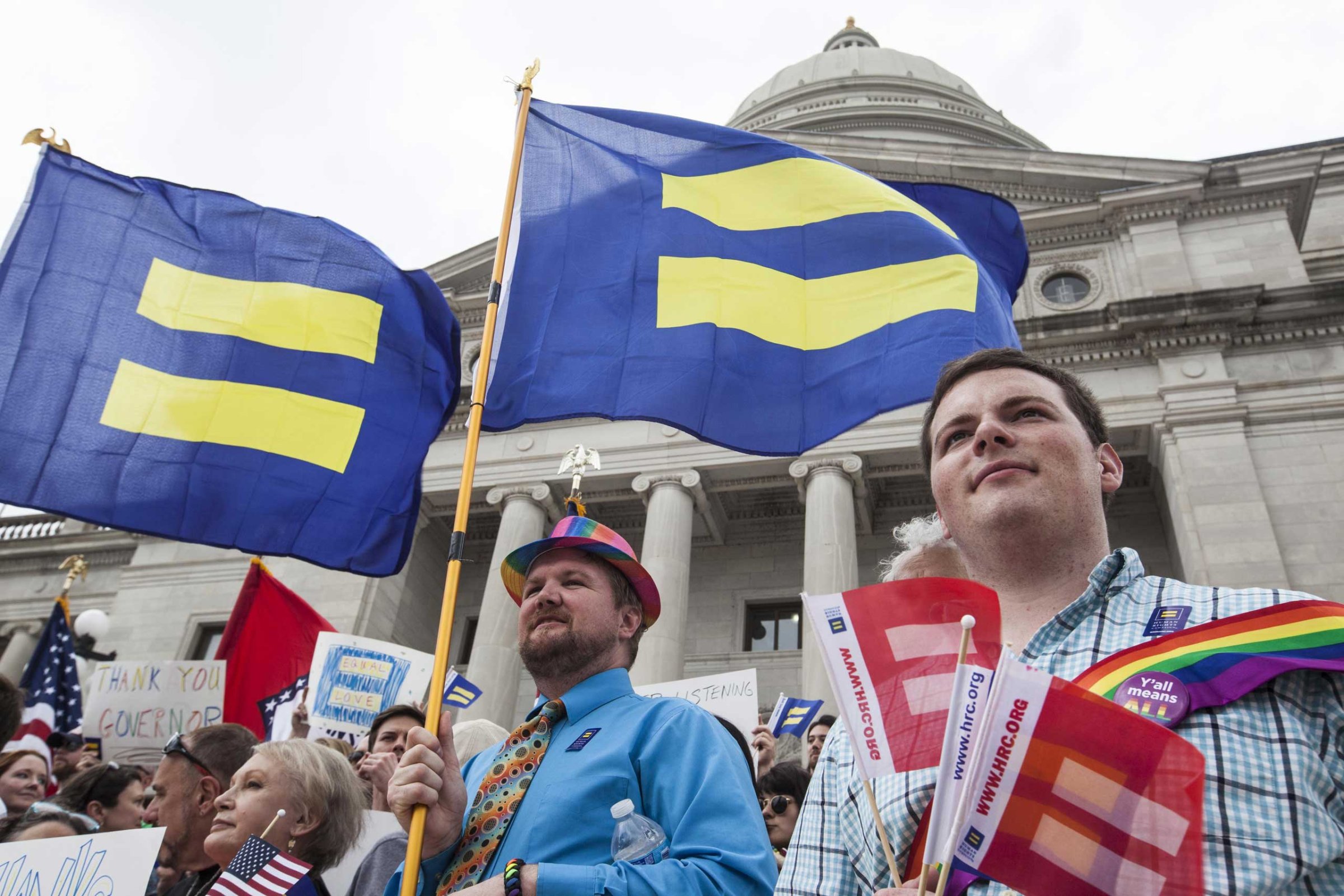
Conservative activist Bob Vander Plaats had just one question for the four presidential hopefuls gathered in the chapel at Iowa Wesleyan University: How would they preserve religious liberty?
It’s an idea as old as the country, but for the 600 people in the audience and social conservatives elsewhere in Iowa, religious liberty is fast becoming a new litmus test for Republican presidential candidates, thanks to a recent uproar over religious freedom legislation in Indiana and Arkansas.
Hosted by Vander Plaats’ Family Leader organization, the event Thursday was designed to make Iowa ground zero on the issue. For their part, the candidates’ responses showed broad agreement that religious freedom in general and Christianity in particular are under assault from the federal government.
“It is wrong for our government to discriminate against Christians,” Louisiana Gov. Bobby Jindal told the crowd at Iowa Wesleyan, listing off a litany of alleged sins, from requirements that employer healthcare plans include contraceptive coverage to anti-discrimination laws that don’t allow businesses to reject work on same-sex weddings. “It is wrong for our government to force these businesses to choose between going out of business or violating our sincere beliefs.”
The event, which also featured former Texas Gov. Rick Perry, former Arkansas Gov. Mike Huckabee and former Pennsylvania Sen. Rick Santorum, capped a day of GOP candidates scurrying to drive up their support with evangelical voters. Earlier in the day they—along with Texas Sen. Ted Cruz—attended a homeschooler conference hosted by the Network of Iowa Christian Home Educators in the state capital.
“The last few weeks have been heartbreaking with what we’ve seen in Indiana and Arkansas,” Cruz told the roomful of about 1,000 homeschooling parents and children. “We’ve seen religious liberty under assault.”
Religious liberty, Vander Plaats said, “will be the key issue of the 2016 campaign” in Iowa.
The gatherings drew little in the way of disagreement. “I look at them not as opponents, but as colleagues,” Huckabee said of his fellow contenders at the evening summit. Perry opened his speech at the Family Leader praising Santorum as a national leader of the pro-life movement and Jindal for his efforts on job promotion at home.
But beneath the agreement was the hard reality that all five hopefuls are depending on the same united social conservative bloc to bring them over the finish line, and right now it is split between all of them as well as Wisconsin Gov. Scott Walker.
The discussion comes as conservatives are basing their candidacies on the notion that Republicans have lost the White House because they have been insufficiently pure. Cruz argued that millions of evangelicals stayed home in the 2012 election out of frustration with more moderate candidates. “Our problem in previous elections wasn’t that we were too conservative, it was that we weren’t sincerely conservative,” Jindal said.
That political backdrop left the candidates jostling to prove their credentials fighting on issues important to evangelical caucus-goers and social conservatives nationally, from opposition to abortion to religious freedom laws like the one passed in Indiana. They touted their support for accreditation of Bible colleges.
“It’s part of a broader assault on people of faith,” Cruz said. “It’s part of a broader assault on Christians. It’s part of a broader assault trying to drive faith out of the public sphere. And in my view, in 2016, religious liberty should be front-and-center in this next election.”
“Religious liberty has been a passion of mine for over two decades,” Cruz added over the din of crying babies and gaggling toddlers. “I’ve been proud to have had the opportunity to fight and stand for religious liberty over and over and over again.”
Not to be outdone, Santorum, who won the caucuses in 2012, cast himself as ahead of the curve in fighting for religious liberty and against same-sex marriage when he was in the Senate a decade ago. “Karen and I homeschooled for 19 years—we were pioneers,” he added.
Perry drew applause for telling of his religious journey, describing himself as “lost” after leaving the military and returning to his parents’ home. “I was lost figuratively and literally about what I wanted to do in my life. God really wadded me up,” he said. “I told him I really wanted to live my life for him. So from 1977 on, God has given me an extraordinary second chance.”
Jindal scored the best-received performance Thursday evening with a biography-heavy stump speech punctuated by a strong condemnation of government interference in religious life. He criticized the “unholy alliance between Hollywood and big business” in Indiana opposing the state’s Religious Freedom Restoration Act, calling it hypocritical that the same companies that do business in countries that discriminate against gays and lesbians and Christians were attacking the Indiana law.
Huckabee, who won the 2008 Iowa caucuses, used his time at the Family Leader conference to warn that conservatives were losing the fight to define marriage as only being between a man and a woman. He criticized President Obama for “using his precious time in the Oval Office to call people up to congratulate them for being gay.” He added, “[Navy SEAL Chris Kyle’s] widow didn’t get a phone call, but a football player who came out did.”
More Must-Reads from TIME
- Why Trump’s Message Worked on Latino Men
- What Trump’s Win Could Mean for Housing
- The 100 Must-Read Books of 2024
- Sleep Doctors Share the 1 Tip That’s Changed Their Lives
- Column: Let’s Bring Back Romance
- What It’s Like to Have Long COVID As a Kid
- FX’s Say Nothing Is the Must-Watch Political Thriller of 2024
- Merle Bombardieri Is Helping People Make the Baby Decision
Contact us at letters@time.com